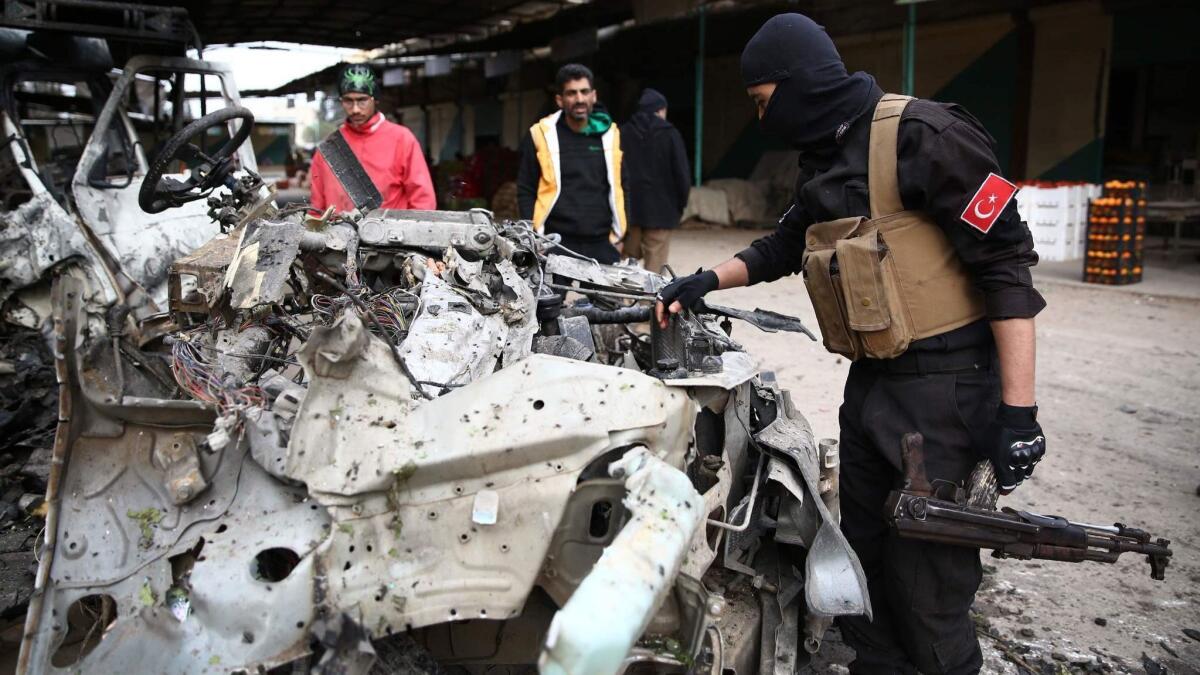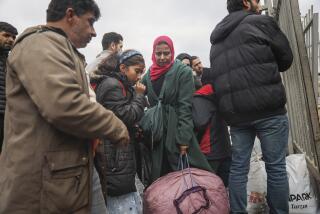Bomb kills 8 in Syrian town held by Turkish-backed forces, activists report

- Share via
Reporting from Beirut — A bomb blast in a northwestern Syrian town held by Turkish-backed opposition forces killed at least eight people and wounded two dozen Sunday, activists and local security said, the latest in a series of attacks along the border where Turkey has troops.
The spike in attacks follows Turkish threats to expand its offensive against U.S.-backed Syrian Kurdish forces, moving from the areas it controls in northwestern Syria to the east, where U.S troops are also based. The U.S-led coalition against Islamic State backs the Syrian Kurdish fighters who have gained control of nearly 30% of Syrian territory, mostly in eastern Syria, after chasing out Islamic State militants from the area. But Turkey considers the Kurdish militia an extension of an insurgency within its territory.
Turkey has backed Syrian opposition fighters to fight Islamic State militants and uproot the Kurdish militia from along its borders since 2016.
Meanwhile in Doha, Turkey’s foreign minister said if Syrian President Bashar Assad were to win internationally monitored elections, then Turkey and other countries would consider working with him.
“If it’s democratic elections and if it’s a credible one, then everybody should consider that,” Mevlut Cavusoglu said, speaking at the Doha Forum in Qatar.
The Turkish minister said “credible, transparent, democratic and fair elections” must take place where Syrians, including those abroad, can vote.
Besides its military operations, Turkey has been engaged with Russia and Iran, the two main allies of Assad in the war, leading cease-fire talks and efforts to form a constitutional committee made up of representatives of Assad’s government and the opposition, which Ankara backs. Cease-fires have largely held, but the formation of a constitutional committee has stalled amid disagreements over representation.
Images of the Sunday attack showed small fires and damaged vehicles at a busy market in central Afrin. Vegetables and other merchandise littered the ground, as sirens rang out and rescuers searched for casualties.
The Britain-based Syrian Observatory for Human Rights, a pro-opposition war monitor, said the explosion killed eight people and appeared to have been caused by a car bomb. It said the bomb went off in a market near the base of one of the Islamist opposition groups governing Afrin. The activist-operated Shaam news agency reported the same toll.
Ahmed Kurdi, a local security official, said the bombing killed eight and wounded 24 others, all of them civilians. He said a second car bomb was discovered and diffused before it exploded.
An attack on Thursday killed at least three civilians and one Turkish soldier.
The U.S.-Kurdish alliance has soured relations between Ankara and Washington. Turkey has long protested U.S. support of the People’s Protection Units, Kurdish militias also known as YPG. Turkey views the YPG as an extension of the separatist Kurdistan Workers Party, which has fought a decades-long guerrilla war against Turkey.
The U.S. military has set up observation posts to try to prevent friction between its NATO ally and the Syrian Kurdish militia. The Pentagon on Wednesday warned Turkey against unilateral action in northeastern Syria.
Late Saturday, the European Union foreign policy chief, Federica Mogherini, said a possible Turkish operation in eastern Syria is a source of “concern.”
She called on Turkey to refrain from any unilateral action, which it said would likely undermine efforts against Islamic State militants in the area or “risk further instability in Syria.”
Turkish troops and allied Syrian forces drove the Kurdish militia out of Afrin in March. The majority-Kurdish town has since been controlled by Turkey-backed opposition fighters, but has often come under attack from Kurdish insurgents in the area. The Kurdish militia and affiliated groups complain of a systematic campaign by Turkey’s allies to drive out the local Kurdish population.
More to Read
Sign up for Essential California
The most important California stories and recommendations in your inbox every morning.
You may occasionally receive promotional content from the Los Angeles Times.










